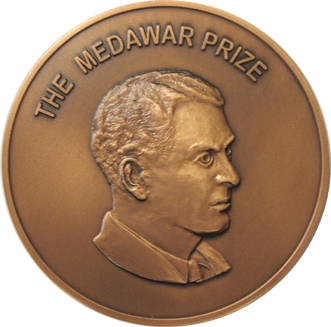
In Memoriam - Leslie Baruch Brent
1925-2019
TTS Medawar Laureate
Leslie B. Brent, passed away on December 21st 2019. His contributions in terms of neonatal tolerance were a part of the foundation of transplantation immunology and were truly significant.
These paradigm-changing achievements were made against an extremely limited knowledge and understanding of the immune system at that time. No B and T cells. Antibodies were mysterious ‘lock and key’ proteins. ‘Homografting’ (allogenic transplantation) had long been considered impossible, for reasons unknown.
Leslie joined the research group of Peter Medawar in 1951, selected because of his outstanding undergraduate performance, to work alongside his research fellow, Rupert Billingham. Medawar reported in 1944 that rabbit skin homo (allo) graft rejection is a specific acquired immunological process.
Ray Owen learned that twin calves fathered by different sires, but sharing a placenta, could be chimeric having both sets of paternal red blood cells and, remarkably, were tolerant of them both sets (Owen 1945). Fenner and Burnet (1949) created the concept of self- non-self discrimination, and Burnet had postulated that the body becomes tolerant of any antigen present in the fetus. However, using antibody responses, Burnet found no evidence for his hypothesis. Medawar and his colleagues (1951 and 1952), with his focus on skin grafting and knowing of Owen’s observations, went on to show that chimeric cattle twins were fully tolerant of each other’s skin for a long time after birth. This leads us to the work of Leslie Brent to establish an experimental model of neonatal tolerance in mice. He engaged in, literally, dozens of experiments looking for results to fit the Burnet hypothesis, injecting minced tissue fragments into mouse embryos through the exposed abdominal wall of their mothers. Leslie himself described the frustrations and failures of this work but, true to his character and self-belief, he persisted with different inocula at different times. The experiment forming the core of the seminal paper ‘Actively Acquired Tolerance of Foreign Cells’, published in Nature in 1953, was numbered Experiment 73! In this experiment, a mixture of minced testis, kidney and spleen tissues from A-strain mice was injected into 15-16 day CBA embryos in utero. The five in utero injected progeny were transplanted, when 8 weeks old, with A-strain skin grafts. Two rejected promptly. One rejected its graft in delayed fashion. The other two mice fully accepted skin grafts from A-strain mice. Of these two, one received and accepted a second A-strain skin graft. At 77 and 101 days, respectively, the two ‘tolerant’ animals were injected intraperitoneally with fragments of lymph nodes from CBA mice immunized against A-strain skin, based on the observations of Mitchison (1953) that graft rejection can be ‘passively transferred’ in this way. Both mice rejected their grafts. The adoptive transfer of immunity proved that graft survival was due to a failure of immunity rather than any adaptation of the grafted skin.
Leslie may have been denied first authorship of the Nature paper that appeared in 1953 because Medawar preferred to place authors in alphabetical order, namely Billingham, Brent and Medawar. However, his primary role in the design and execution of these experiments was rewarded when Leslie was selected to present his findings orally to the Royal Society.
With a long list of collaborators and coworkers, Leslie continued his work on transplantation immunity and tolerance, looking at quantitation and immunogenicity of alloantigenic stimulation, definition of partial tolerance and the use of adjuvants and drugs to promote the induction of tolerance. His interests also extended to anti-lymphocyte serum with the thought that it might create a pro-tolerance environment in immunocompetent animals. He tried to induce transplantation tolerance in monkeys by in utero injection of allogeneic bone marrow cells into blood vessels of the umbilical cord, an attempt largely thwarted by technical difficulty and graft-versus-host disease in the fetus. Leslie could be quite forceful in expressing his own views. For example, he and Medawar had determined that antibodies play no role in skin graft rejection and insisted for years that they are an ‘epiphenomenon’.
Leslie was always prepared to defend his published work. In particular, the Medawar team showed that the offspring of neonatally tolerant mice did not inherit that tolerance, demonstrating that somatic manipulation of the parent did not affect the heritable germline. However, in the early 1980 a paper suggested that neonatal tolerance could be inherited. Leslie devoted huge amounts of time and resources to disprove this. Ultimately, he failed to confirm the inheritance of acquired tolerance, thus reinforcing his conviction that larmarkian inheritance does not apply to transplantation tolerance.
Leslie contributed enormously to the transplant community during his long career, through his commitment to Societies, editorships, mentorships and so much more.
He had been President of The Transplantation Society, 1976-78 and editor of ‘Transplantation’ at the inception of the Journal in 1963. Leslie had academic appointments at the University College London, The California Institute of Technology, the National Institute of Medical Research, the University of Southampton and St. Mary’s Hospital Medical School, London. He was a member of the European Academy of Arts and Science, and an honorary member of the British Society of Immunology.
His educational work on the holocaust was posthumously acknowledged in the 2020 New Year Honors by his appointment as a Member of the Order of the British Empire.
Professor Brent continued to attend meetings and participated in research programs well after his formal retirement. He was a complex and brilliant man, a leader, a figurehead of transplant immunology who will be greatly missed.
- Professor Ian Hutchinson
Articles about and by Leslie Brent
Social
Contact
Address
International Intestinal Rehabilitation & Transplant Association
c/o The Transplantation Society
740 Notre-Dame Ouest
Suite 1245
Montréal, QC, H3C 3X6
Canada




